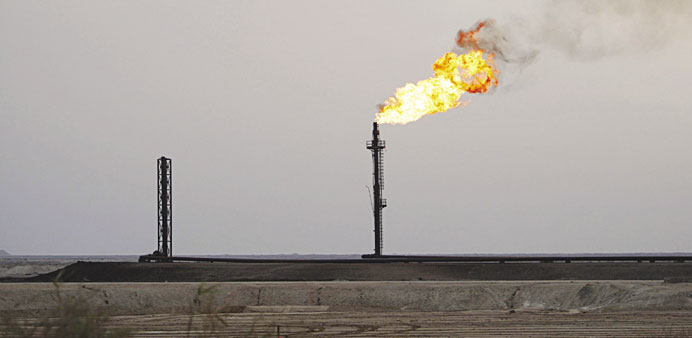A flame rises from a tower at Majnoon oilfield in Iraq’s southern province of Basra. Iraqi oil production fell the most among Opec members in March, declining 288,400 bpd to 3.2mn a day.
Bloomberg /London
Opec trimmed estimates for the amount of crude it will need to pump this year amid rising US supplies, and predicted that a “supply buffer” will accumulate before demand peaks in the summer.
The Organisation of Petroleum Exporting Countries, responsible for 40% of the world’s oil supply, will need to provide an average of 29.6mn bpd of crude this year, according to its monthly market report. The assessment is 100,000 bpd lower than last month’s because of higher output from the US and Canada, and in line with the group’s March production level.
Oil inventories, currently “tight,” will rebuild as demand sags in the second quarter, it said.
Reliance on Opec is being frayed as the US pumps the most crude in more than two decades by tapping shale formations in North Dakota and Texas. Brent crude futures have lost 2.9% this year, trading for $107.58 a barrel yesterday in London, amid speculation Opec members Libya and Iran may restore supplies curbed respectively by political unrest and sanctions.
Opec would “accommodate” their return to the market, group secretary general Abdalla El-Badri said in Doha on Wednesday.
“Demand for Opec crude for 2014 was revised down” from last month “reflecting the upward adjustment of non-Opec supply,” the group’s Vienna-based secretariat said in the report. “Oil markets have now entered into a period of lower demand, which provides the opportunity to re-build tight product inventories.”
Opec’s 12 members reduced production by 626,200 bpd to 29.6mn a day in March because of declines in Iraq, Angola and Libya, according to secondary sources cited by the report. Iraqi production fell most, declining 288,400 bpd to 3.2mn a day, according to the report, which didn’t specify a reason.
The second-largest drop was in Angola, where output fell by 154,800 bpd to 1.5mn a day, followed by Libya, where supplies slipped by 117,700 a day to 243,000 a day. Saudi Arabia, the group’s biggest member, trimmed output by 80,500 bpd to 9.7mn a day.
The group boosted its projection of supplies from outside Opec by 60,000 bpd. Non-Opec producers, led by the US, Canada and Brazil, will increase output by 1.4mn barrels a day in 2014 to 55.6mn a day.
The organisation kept its forecast for global oil demand in 2014 stable. World consumption will increase by 1.1mn bpd, or 1.3%, to 91.2mn a day, the report indicated.
Opec’s 12 members are Algeria, Angola, Ecuador, Iran, Iraq, Kuwait, Libya, Nigeria, Qatar, Saudi Arabia, the UAE and Venezuela. The group will next meet on June 11 in Vienna to discuss output targets.
The International Energy Agency, the Paris-based adviser to oil-consuming nations, will release its monthly report with forecasts of supply and demand today.

